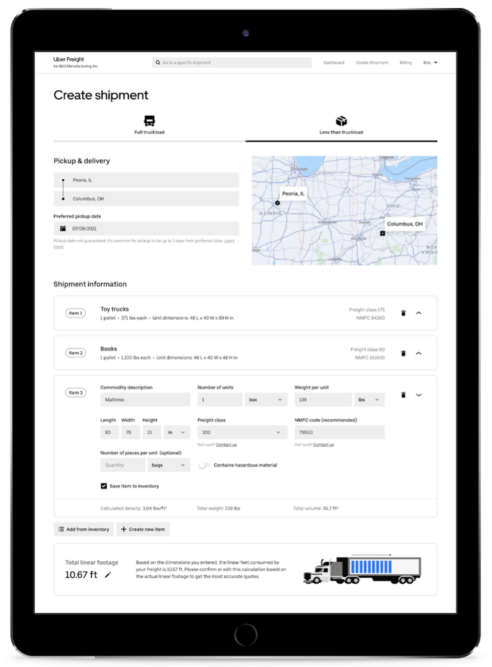Uber Freight expands truckload brokerage product into LTL sector
Digital platform teams with BlueGrace Logistics to launch less-than-truckload offering, citing high demand.

Online truckload broker Uber Freight is expanding into the less-than-truckload (LTL) market, bringing its digital freight matching app into a sector that is being squeezed by historically tight capacity even as the nation continues its economic recovery from pandemic shutdowns.
Offering service for LTL freight appears to be a safe bet, given recent analyses by the Logistics Manager’s Index (LMI) and the third party logistics provider (3PL) Transportation Insight that demand for cargo space in trucks is set to outpace supply at least through the second half of 2021.
Other transportation industry players have also focused on the opportunity to address the hot need for LTL capacity, such as the news earlier this month that truckload carrier Knight-Swift Transportation Holdings Inc. had entered the LTL space through a $1.35 billion acquisition of LTL carrier AAA Cooper. Likewise, XPO Logistics is spinning off its contract warehousing arm as a new company called GXO, to focus on freight brokerage and LTL.
San Francisco-based Uber Freight is reading many of the same tea leaves with its decision to open its digital platform to LTL shipments. The company has plenty of financial leverage to make the change, thanks to the $500 million venture capital round it raised in 2020. And to accelerate its new product launch, Uber Freight will team with the 3PL BlueGrace Logistics, tapping into its established technology infrastructure and LTL expertise, the partners said.
In a blog post, Uber Freight said its move to LTL will provide “shippers with a single platform to support their full truckload and LTL needs—furthering our goal of becoming a one-stop-shop solution for shippers.”
“After a year of unprecedented volatility, choice and flexibility are more important than ever to shippers,” Lior Ron, Head of Uber Freight, said in the post. “Just as we did with the full truckload market, we’re using all our marketplace technology and data science expertise to bring much-needed transformation and new opportunities to LTL. It’s a segment of the industry that is not only in high demand but also furthers our journey to support shippers across first-to-final-mile logistics.”
Uber Freight says the LTL market has room for “efficiency improvements” to address shortcomings such as limited visibility, market constraints, and increased demands. Existing tools can’t handle those challenges because “today’s LTL market offerings are clunky and are limited for small and medium-size businesses that often have to navigate multiple logins and touchpoints on antiquated LTL websites in order to ship their freight,” the company said.
Moving into the LTL market will provide even more opportunities for shippers. Learn more. https://t.co/jDUdpUQQcs
— Uber Freight (@UberFreight) July 15, 2021
Related Articles
Copyright ©2024. All Rights ReservedDesign, CMS, Hosting & Web Development :: ePublishing